
As a young student in high school, I was greatly thrilled by the adventures of literature. Having grown up in the rural landscape and appreciative of the cultural heritage of our time, reading Ngugi wa Thiong’o's books felt like walking in familiar territory.
The vivid descriptions of the two hills that lay by each other and a river that never stopped flowing were all too close. Ngugi’s live depictions and use of simple language captured my countryside life with amazing accuracy.
It made the story all too personal. In A Grain of Wheat, history is relayed in great detail. Not only dwelling on the liberation struggle and its ensuing toll on the socioeconomic fabric, but also the individual struggles that defined the society to its most basic level.
The story of Gitogo was particularly devastating. Born dumb and deaf, when the colonial guards invaded his village and ordered everyone to lie down, poor Gitogo decided to run in the confusion.
The guard manning the exit opened fire, and in a fraction of a second, he lay in a pool of blood. As was the tradition, the administration reported the success in bringing down a great terrorist who had been a great pain to the colonial office. The scene depicts the personal journey of many caught up in a system that has no patience to understand their circumstances. Innocent victims who paid the ultimate price for the struggle.
They are often women and children, but also the disabled. Their story is told through Gitogo. The personal sacrifices that people made in the struggle are often never told.
Gikonyo's story delves into the heart-wrenching narrative that is true to every struggle. After he was released from detention, the thought of going back to his wife and children filled his heart. When you are denied freedom, the longing for home and the images as you left them presented a huge surprise for many returnees.
For Gikonyo, the joy is soon cut short when he goes back only to find his wife with a child strapped to her back. This killed his spirit and Gikonyo was never the same. He felt rejected and betrayed by the people he loved the most. The personal journey of the liberation fighters is told in this story.
Women caught up with huge families to fend for, and husbands detained with no assurance of coming back. It is often said that if you want to destroy a man, start with his family. The colonial system perfected this tool by mass incarceration of men, both to reduce the population but also to deny the much-needed leadership at the home unit. The betrayal was not just at the hands of the colonists but right within the family.
The personal cost of the struggle to the individual tore through the body, mind and spirit. But when all is said and done, we must agree that for the seed to grow, it must die first. For society to evolve, there must be willingness by the individuals to make personal sacrifices for the greater good.
There is no hope without sacrifice. Then came the politics of language and the encoded message of enslavement that was perpetuated by the colonial system. As a little boy in early school, I came face to face with the 'monto'. This was a piece of wood that was left among students and anyone who spoke their mother tongue would be given its custody. When the teacher came round, they would ask who had the monto and the necessary punishment would be administered.
You would be stigmatised for speaking your mother tongue. Unfortunately, the effects of the monto are still visible today in the Wafulas who cannot utter a word in Bukusu and Wambuis who speak their Gikuyu with the King's intonation. The colonial architecture was meant to destroy not just one generation, but many more after.
A man who does not know his culture has nothing to teach his children. Slowly, you begin to realise the disorientation of the African soul and the need to decolonise the mind. You cannot teach your culture in a foreign language. In his early short story collection, A Mercedes Funeral, Ngugi narrates how Wahinya, a watchman at Ilmorog Bar and Restaurant, lived in poverty, but upon death, everyone wants to contribute and make the funeral a great send-off.
Some even suggest making a casket in the shape of a Mercedes to capture the moment. In it, he exposes the hypocrisy of making people great by grandiose funerals. No wonder he chose not to have a Mercedes funeral. Smooth exit. His legacy is not just in life but also in death. Koma thayu, Ngugi (rest in peace, Ngugi).
Cabinet Secretary, Ministry of Investments, Trade and Industry











